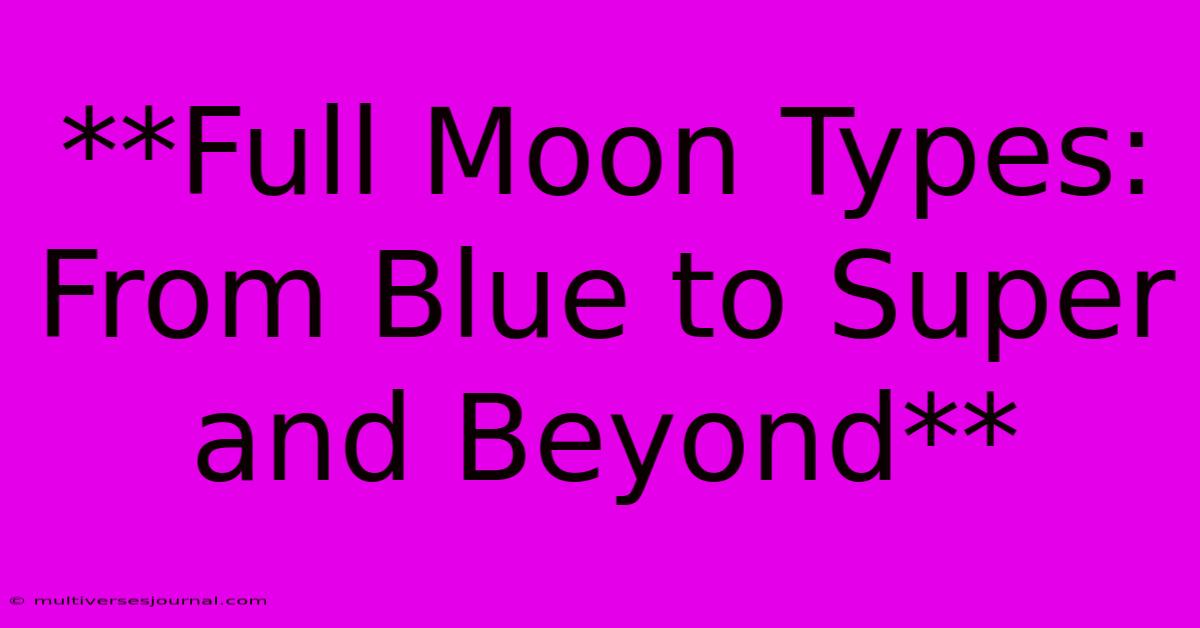**Full Moon Types: From Blue To Super And Beyond**

Discover more detailed and exciting information on our website. Click the link below to start your adventure: Visit Best Website multiversesjournal.com. Don't miss out!
Discover more detailed and exciting information on our website. Click the link below to start your adventure: Visit Best Website mr.cleine.com. Don't miss out!
Table of Contents
Full Moon Types: From Blue to Super and Beyond
The moon, our celestial neighbor, has captivated humans for millennia. Its phases, particularly the full moon, have been woven into folklore, myth, and even scientific observation. But did you know that not all full moons are created equal? There are various types of full moons, each with its own unique characteristics and names. Let's embark on a journey through the fascinating world of full moon types!
The Blue Moon: A Rare Sight
The term "blue moon" doesn't refer to the moon actually turning blue. Instead, it's a rare occurrence when two full moons happen within a single calendar month. This phenomenon, which happens approximately every two to three years, is a delightful surprise for skywatchers. The next blue moon is slated for August 31, 2023, so mark your calendars!
The Super Moon: A Bigger, Brighter Moon
A supermoon occurs when the moon reaches its full phase during its closest point to Earth in its orbit. This proximity makes the moon appear larger and brighter than usual, a truly breathtaking sight. While supermoons happen several times a year, they are still a special event for moon enthusiasts.
The Harvest Moon: A Farmers' Friend
The harvest moon, usually the full moon closest to the autumnal equinox, plays a significant role in agricultural traditions. In the past, farmers relied on its extra light to extend their working hours during the crucial harvest season. Today, it still holds a special place in our hearts, symbolizing abundance and the transition into autumn.
Other Full Moon Types and Their Names
Beyond these well-known types, there are countless other names given to full moons throughout the year, often rooted in ancient traditions and cultural beliefs. Some of these include:
- Wolf Moon (January): Named for the howling wolves that are more active during this time.
- Snow Moon (February): A reflection of the snowy landscapes that often prevail in winter.
- Worm Moon (March): Marking the emergence of earthworms from the thawing ground.
- Pink Moon (April): Named for the pink wildflowers that bloom during this season.
- Flower Moon (May): Celebrating the abundance of blooming flowers in spring.
- Strawberry Moon (June): A time for harvesting strawberries.
- Buck Moon (July): When male deer grow new antlers.
- Sturgeon Moon (August): A time when sturgeon fish are plentiful.
- Corn Moon (September): Indicating the time for harvesting corn.
- Hunter's Moon (October): Signalling the start of hunting season.
- Beaver Moon (November): A time when beavers are preparing for winter.
- Cold Moon (December): Reflecting the harsh winter conditions.
Observing Full Moons: A Nighttime Delight
The next time you find yourself gazing at the night sky, take a moment to appreciate the different types of full moons that grace our heavens. Whether it's a supermoon illuminating the night or a harvest moon guiding farmers, each full moon offers a unique spectacle and an opportunity to connect with the celestial rhythms of our world.
Don't forget to share your favorite full moon experiences in the comments below!

Thank you for visiting our website wich cover about **Full Moon Types: From Blue To Super And Beyond**. We hope the information provided has been useful to you. Feel free to contact us if you have any questions or need further assistance. See you next time and dont miss to bookmark.
Thank you for visiting our website wich cover about **Full Moon Types: From Blue To Super And Beyond**. We hope the information provided has been useful to you. Feel free to contact us if you have any questions or need further assistance. See you next time and dont miss to bookmark.
Featured Posts
-
College Football Syracuse Vs Pittsburgh Week 9 Odds
Oct 25, 2024
-
Ksu Remembers Former Coach Amir Abdur Rahim
Oct 25, 2024
-
Fenerbahce Vs Man Utd Europa League Live Updates
Oct 25, 2024
-
Syracuse At Pittsburgh Live Score Updates
Oct 25, 2024
-
Sutton Foster Hugh Jackman Private Relationship
Oct 25, 2024
